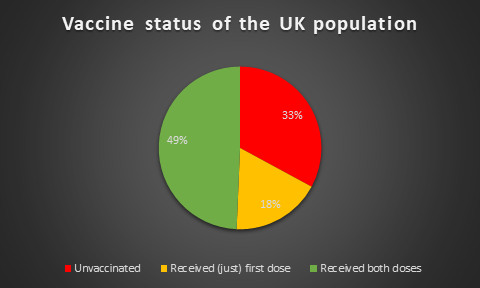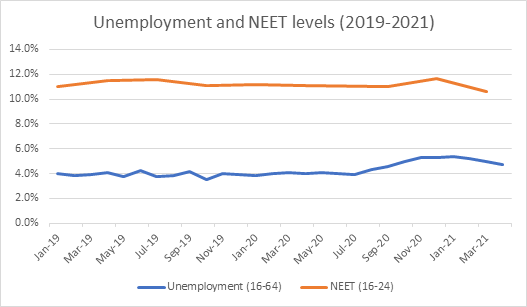This is the 57th of a series of bulletins produced by ISE to update members on key data and policy related to Covid-19. This bulletin covers the period 17th June – 30th June 2021.
You can access all of the Covid-19 bulletins on ISE insights.
Do you want to write these bulletins? If so apply to work at ISE as a researcher / senior researcher.
Latest Covid-19 data

Data taken from Wikipedia and from the government’s Covid-19 dashboard.
The UK has now had over 4.8 million identified Covid-19 cases and 152,000 deaths (with Covid on the death certificate).
The number of cases have now been rising for eight weeks. The number of deaths has been rising for four weeks and although the number of deaths remains relatively low it is now approaching the level that it was during summer 2020.
Covid news

Data from the government’s Covid-19 dashboard.
- Peter Sivey and James Guaghan offer new analysis of data that shows why the lockdown had to be extended and argue that we should follow the data rather than the dates. This leads to questions about whether we will need another lockdown.
- Who should be vaccinated? The argument for the vaccination of children and young people is growing. Meanwhile, the pressure to ensure that the vaccine is administered globally continues to grow. Sophie Harman and her colleagues describe this as the need for vaccine justice as 99% of people in developing countries remain unvaccinated.
Education
- Office for National Statistics publish new data on student behaviour showing that engagement with mental health and wellbeing services has gone up.
- Not all pandemic innovations in education have been good argues Michael Petrilli.
The economy
- The UK’s economic recovery may be at risk when the furlough ends.
- Global economic activity has fallen due to the pandemic, with this particularly impacting on developing countries.
- Public sector borrowing continues to be high. May’s borrowing was the second highest since records began.
The labour market

Drawing on Office for National Statistics data on unemployment and NEET levels.
- There has been a strong recovery in the number of vacancies according to analysis from the Institute for Employment Studies. The Resolution Foundation argue that the labour market is returning to normal rather than booming.
- A lack of work experience offers a barrier for young job seekers argues Charlie Ball.
Changing patterns of work
- Businesses are currently divided about what the future of work is going to look like. With some concerned that employees may suffer detriment to their careers if they work from home. Tulip Sadiq MP makes the case for a legal right to flexible working, while some businesses are arguing against the creation of a legal right to work from home.
- The discussion about homeworking has ignored the fact that very few working class people worked from home during the pandemic argue Tracey Warren and Clare Lyonette.
- Is now the time for more radical thinking about the future of work? Alexia Cambon argues that many of the problems with homeworking are caused by the fact that we have continued to work as if we were still in offices. David Spencer argues that the return to work is an ideal time to move to a four day working week.
Student recruitment and development
- ISE launch the complete guide to student recruitment and development.
- 3 ways that Covid has changed talent attraction from Mike Hanbidge.
- ISE launches a new guide to recruiting international students.


0 Comments